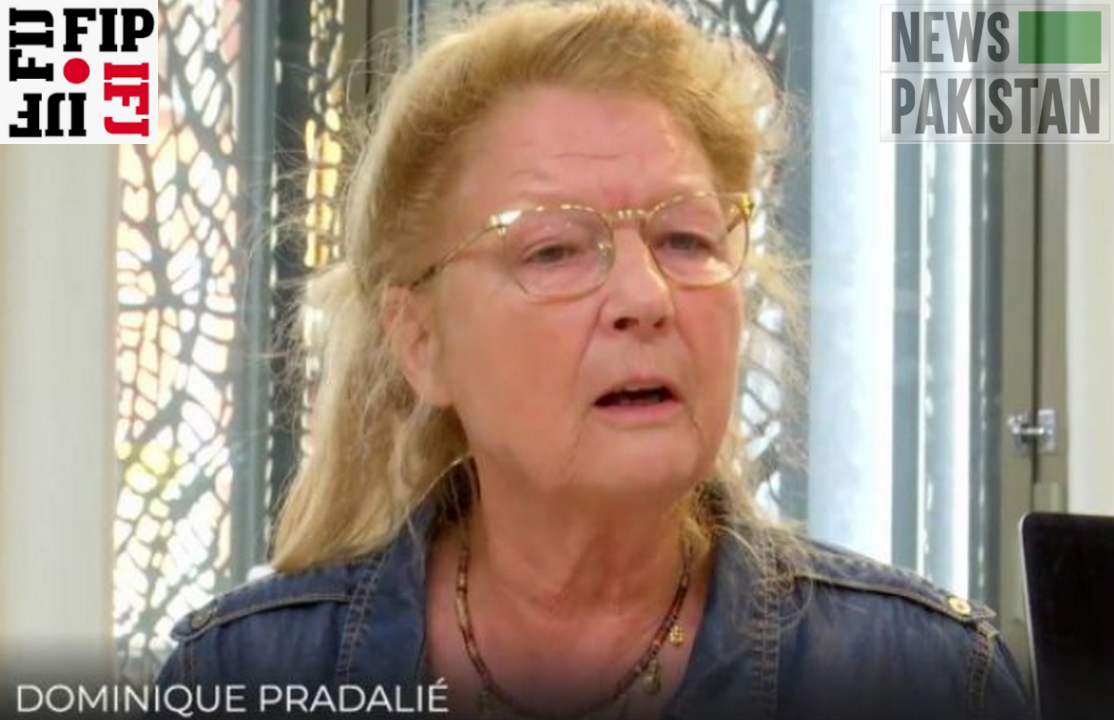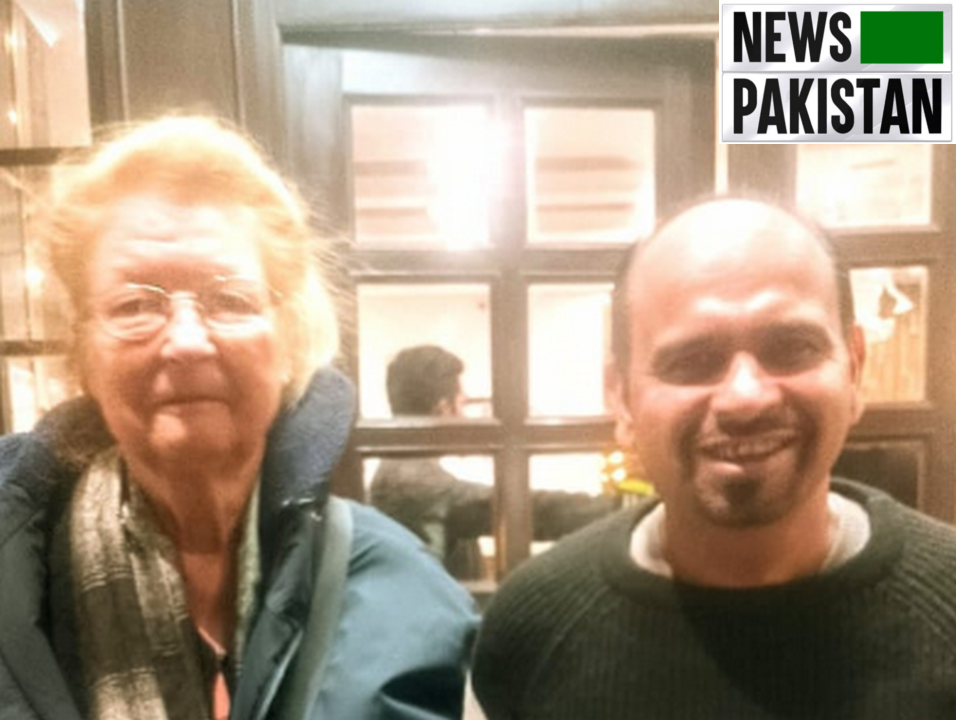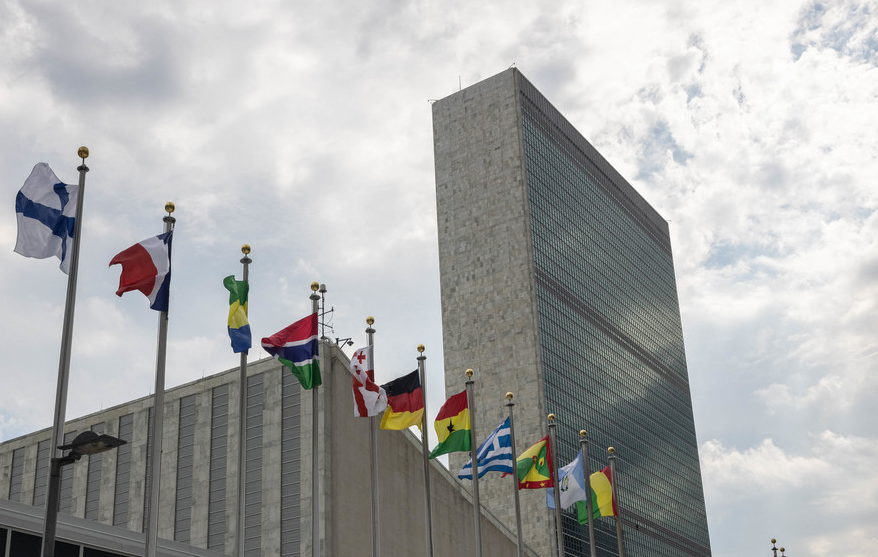ISLAMABAD (NPTV/IFJ): Dominique Pradalié, President International Federation of Journalists (IFJ) joined the leadership of Pakistan Federal Union of Journalists (PFUJ) Friday (14th Feb, 2025) to protest against Prevention of Electronic Crimes Amendment (Peca) 2025 in front of the Parliament building.

On a recent visit coinciding with elections to the Pakistan Federal Union of Journalists (PFUJ) Federal Executive Council, IFJ President Dominique Pradalié urged Pakistani authorities to uphold freedom of expression, repeal the draconian PECA act, and provide urgent support for the nation’s media community. The IFJ stands in solidarity with the Pakistan Federal Union of Journalists in its fight for labour rights and press freedom in Pakistan and urging authorities to guarantee the safety of the press.
On Friday, February 14, IFJ President Dominique Pradalié led a protest march against recent amendments to the Prevention of Electronic Crimes Act (PECA) in Islamabad, alongside PFUJ members, journalists, President Rana Muhammad Azeem, and Secretary General Shakeel Ahmad.
The rally reached the Parliament House in Islamabad that afternoon, facing a strong contingent of armed police while travelling to the D-Chowk area of central Islamabad, opposite the Parliament House building. At the rally, President Pradalié shared a message of solidarity with Pakistan’s media community in “their fight to restore the freedom of speech and expression for a stronger democracy”. PFUJ leadership promised further protests would be held across Pakistan by next week against the amendments if the government failed to commit to a platform benefiting journalists and media workers in Pakistan.
Changes to the PECA, tabled in the National Assembly and passed in just 15 minutes, have been widely criticised by Pakistan’s media community, civil society organisations, digital rights activists, and international observers. The law criminalises disinformation, misinformation, or other digital content seen to likely cause a “sense of fear, panic or disorder or unrest”, with offenders facing up to three years in jail or fines of up to PKR 2,000,000 (approx. USD 7,150).
While in Pakistan, the President monitored the PFUJ’s Federal Executive Council (FEC) elections, announcing the results alongside the commissioner on February 13. Later that afternoon, Pradalié attended a seminar organised by the PFUJ and attended by senior politicians, CPNE President Syed Irshad Arif, and senior journalists, with the speakers condemning the PECA amendments, and demanding that the government allowed journalists to work with freedom and cease censorship.
The President also met with Ambassador of France to Pakistan, His Excellency Nicolas Galey, on February 14 to discuss the Pakistani media landscape in the context of recent developments to PECA. During the meeting, the President praised the French government’s support for Afghan journalists, through the issuances of visas and training programs and workshops. At the meeting, also attended by PFUJ Secretary General Shakeel Ahmed and Federal Executive Council (FEC) member Dr. Furqan Rao, the ambassador stressed France’s continued support for freedom of the press.
The PFUJ said:“The IFJ President Dominique visit to Pakistan was a great success that supported a lot PFUJ and journalists’ campaigns and helped to promote unionism in the country.”
The IFJ said: “Journalists and media workers in Pakistan must enjoy their constitutional rights to free expression and press freedom. The IFJ continues to stand in solidarity with Pakistan’s media community in the wake of draconian amendments to the PECA, and urge authorities to repeal the legislation. The IFJ also acknowledges the dedication of all outgoing PFUJ FEC members and stand in solidarity with the next executive through their coming term.”
PECA bill a tragedy for press freedom: New amendments to Pakistan’s cybercrime law, tabled and passed in the country’s National Assembly on January 23, have been met with outcry from the international media community. The law enables the further regulation of online content, granting the government additional powers to oversee social media platforms through the newly established Social Media Regulation and Protection Authority.
The updated law continues a troubling new provision that penalises the spread of misinformation, disinformation, or content likely to instil fear, panic, disorder, or unrest online, punishable by up to three years in prison or a maximum fine of PKR 2,000,000 (approx. USD 7,150). The Pakistan Federal Union of Journalists (PFUJ) and a coalition of media representative bodies have criticised the bill in a joint statement as a potential mechanism for attacks on the press, and its lack of consultation in drafting.
Met with protests by the media nationally, two petitions have reached the Supreme Court in opposition to the amendments, claiming the bill violated Pakistan’s constitutional human rights commitments. Science passing in 2016, the PECA has been widely criticised by press bodies and human rights groups for its impacts on freedom of expression, demonstrated by a slate of attacks against journalists, activists, and political opponents using the law.
On 10th February, a reporter with Hum News was accused of spreading ‘fake news’ under the bill by Tehsil Bar Council Arifwala President Shakeel Alvi in a First Information Report, with the lawyer claiming the journalist had spread ‘baseless’ information tantamount to ‘defamation and ‘misconduct’ for his reportage of Shakeel’s dismissal from the organisation.

Rejecting Peca as a black law, Dominique Pradalié said that she was protesting for freedom of speech on behalf of International Federation of Journalists that happens to have 600,000 members in 146 countries.
The IFJ maintained: “The amendments to Pakistan’s draconian Peca represent a transparent attempt to further tighten control over digital expression and internet freedom under the guise of curbing misinformation.
“By extending government jurisdiction online, broadening censorship powers, and imposing penalties for vaguely defined offences, this legislation threatens journalists, activists, and the public’s right to information. The IFJ calls on President Asif Ali Zardari to swiftly reject the bill and ensure the constitutional right to freedom of expression is upheld.”
PFUJ leadership GM Jamali, and Rana Muhammad Azeem, said: “These amendments, passed by parliament without any consultation with stakeholders, make the controversial PECA act even more draconian, which was tailored to silence democratic voices and curb freedom of media in Pakistan.”

ISLAMABAD: G M Jamali maintained that all the institutions, including Parliament, Supreme Court and Presidency belonged to the people of Pakistan: “PFUJ had announced that its members alongwith UJs’ leaderships would protest in front of National Assembly building come what may to inform the deaf and dumb temporary occupants of the Parliament that we reject Peca”.
__________
Media and human rights groups have widely condemned controversial new amendments to the country’s Prevention of Electronic Crimes Act (PECA), which would criminalise ‘fake news’, restrict freedom of expression online, and work to curb independent, critical media.
The International Federation of Journalists and its affiliate, Pakistan Federal Union of Journalists (PFUJ), joined hands to demand the immediate repeal of the draconian legislation and urged the government to protect freedom of expression as guaranteed in the country’s Constitution.
The latest draft of changes to Pakistan’s cybercrime law, tabled in the National Assembly on 23rd January, 2025 and passed in just 15 minutes, widens the scope of the Act to further restrict online freedom of expression, enable further regulatory control of content, and grant additional government powers to oversee Social Media platforms, including expanding the powers previously held by the Pakistan Telecommunications Authority through the establishment of a new Social Media Regulation and Protection Authority.
Among the changes is a new provision, Section 26(A) which penalises those who disseminate misinformation, disinformation, or any information likely to cause a “sense of fear, panic or disorder or unrest” online, with up to three years imprisonment or a maximum fine of rupees two million.
Pakistani Media stakeholders strongly opposed the government ordinance in a joint statement, with representatives of PFUJ, All Pakistan Newspapers Society (APNS), Council of Pakistan Newspapers Editors (CPNE), Pakistan Broadcasters Association (PBA), and Association of Electronic Media Editors and News Directors (AEMEND) warning that, given the state’s poor track record in safeguarding digital freedom of expression, the proposed bill could become another tool to target journalists, political activists, human rights defenders, and dissenting voices by criminalising criticism of state institutions.
The organisations expressed concern at the “alarming” Section 26(A), the bill’s unclear definition of ‘fake news’, and ambiguous and excessive penalties for offences, criticising the legislation for being introduced without any meaningful consultation or public debate. The formation of four new authorities to oversee digital content regulation was also condemned, with media stakeholders highlighting that this would lead to “disproportionate, multi-layered controls” and create a “chilling effect” on freedom of expression and opinion.
“These provisions grant authorities the ability to block or remove content based on vague criteria, undermining the right to freedom of expression and failing to align with the principles of proportionality and necessity under international human rights law,” said the group.
Concern was also raised at a provision that would see appeals to the newly proposed Social Media Protection Tribunal, composed of government-appointed members, sent directly to the country’s Supreme Court, leading to reduced judicial oversight and increased executive influence.
Since passing in 2016, the PECA has received widespread global criticism from human rights groups for its impact on freedom of expression and access to information, with journalists, activists, and political opponents targeted under the law and the government enforcing frequent shutdowns of online platforms.
Newspakistan.tv













